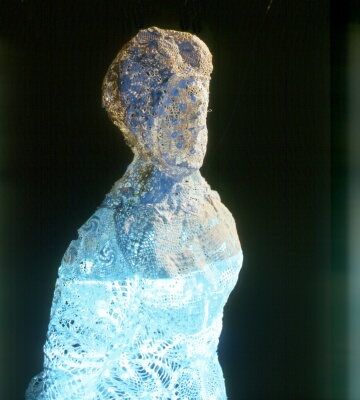Narrative Threads - About the Grandmothers:
Mary Gelling Sullivan Reynolds ("Out of (W)hole Cloth") has no documented history, only the family stories which somewhat disagree and leave many gaps. If the stories are true, she was born in Liverpool in 1874 into an impoverished family of ten. After losing two children to malnutrition, Mary's parents agreed to give Mary, then twelve, and her five-year-old brother over to a charitable group who sponsored what were known as Home Children. The Home Children movement, started by Dr. Barnardo's Children's Home and carried on by many other groups, was a social experiment whereby slum children and other children in need were sent as indentured servants to farms in the Canadian colonies where manpower was desperately needed. It was seen as a great opportunity by Mary's family. The care of her brother was entrusted to her; however, the authorities separated them upon embarking on the ship and she was never to lay eyes on him again nor learn what had become of him. She searched for him the remainder of her life.
After losing two children to malnutrition, Mary's parents agreed to give Mary, then twelve, and her five-year-old brother over to a charitable group who sponsored what were known as Home Children. The Home Children movement, started by Dr. Barnardo's Children's Home and carried on by many other groups, was a social experiment whereby slum children and other children in need were sent as indentured servants to farms in the Canadian colonies where manpower was desperately needed. It was seen as a great opportunity by Mary's family. The care of her brother was entrusted to her; however, the authorities separated them upon embarking on the ship and she was never to lay eyes on him again nor learn what had become of him. She searched for him the remainder of her life.
In Quebec, Mary went to work on a farm; one family story has that she was the only female on the place. She certainly was beaten and ridiculed; on the day that her indenture was up, she walked twenty miles back to the railroad station and took a job as a cook. At some point, she crossed the border into New York state, married, and had two children; her husband deserted the family when he killed a man. She met my grandfather, a railroadman traveling through town, and they lived together as man and wife though they could not get married until many years later, when they were able to ascertain the death of her first husband. Meanwhile, they had four more children (her last, my father, at age forty-seven). The family moved often, as my grandfather had terrible strength and temper, and supposedly killed several men in fights; this did not advance his career, and the family was very poor. Throughout her life, her one creative outlet was to crochet doilies, which she did voraciously, even after suffering a stroke and incurring a massive tremor. She died at age 80, a year before I was born.
Paula Kuehle Huebner ("Wave Goodbye to Grandma") was born in 1901 near Bremen, Germany, into a large middle-class family that owned at least a farm and a shop building in Wuppertal. The family fortunes changed with the onset of World War
 I; two of her brothers were killed in action and the family reduced to poverty in the economic devastation of the Weimar Republic. With few options, Paula agreed to marry my grandfather, a man four years younger and from humbler origins, largely on the strength of his recent emigration to the US. She emigrated in 1929. My grandfather's job survived the Depression, and they had one child, my mother. My grandfather being alcoholic and abusive when drunk, the marriage was strained early. During World War II, Paula took the opportunity to work in a factory, and continued after the men came home; very rare for her generation. At the same time, the family was repeatedly investigated by the FBI during the war, as were many Germans. She was able to visit her family in Germany twice before she died, but was essentially isolated in her life in New Jersey, especially after my family moved out to California in 1962. She became ill of colon, then liver cancer in 1966, and was nursed by my mother at our home until she died there. Neither she nor I were ever told of the terminal nature of her illness.
I; two of her brothers were killed in action and the family reduced to poverty in the economic devastation of the Weimar Republic. With few options, Paula agreed to marry my grandfather, a man four years younger and from humbler origins, largely on the strength of his recent emigration to the US. She emigrated in 1929. My grandfather's job survived the Depression, and they had one child, my mother. My grandfather being alcoholic and abusive when drunk, the marriage was strained early. During World War II, Paula took the opportunity to work in a factory, and continued after the men came home; very rare for her generation. At the same time, the family was repeatedly investigated by the FBI during the war, as were many Germans. She was able to visit her family in Germany twice before she died, but was essentially isolated in her life in New Jersey, especially after my family moved out to California in 1962. She became ill of colon, then liver cancer in 1966, and was nursed by my mother at our home until she died there. Neither she nor I were ever told of the terminal nature of her illness.

 After losing two children to malnutrition, Mary's parents agreed to give Mary, then twelve, and her five-year-old brother over to a charitable group who sponsored what were known as Home Children. The Home Children movement, started by Dr. Barnardo's Children's Home and carried on by many other groups, was a social experiment whereby slum children and other children in need were sent as indentured servants to farms in the Canadian colonies where manpower was desperately needed. It was seen as a great opportunity by Mary's family. The care of her brother was entrusted to her; however, the authorities separated them upon embarking on the ship and she was never to lay eyes on him again nor learn what had become of him. She searched for him the remainder of her life.
After losing two children to malnutrition, Mary's parents agreed to give Mary, then twelve, and her five-year-old brother over to a charitable group who sponsored what were known as Home Children. The Home Children movement, started by Dr. Barnardo's Children's Home and carried on by many other groups, was a social experiment whereby slum children and other children in need were sent as indentured servants to farms in the Canadian colonies where manpower was desperately needed. It was seen as a great opportunity by Mary's family. The care of her brother was entrusted to her; however, the authorities separated them upon embarking on the ship and she was never to lay eyes on him again nor learn what had become of him. She searched for him the remainder of her life. I; two of her brothers were killed in action and the family reduced to poverty in the economic devastation of the Weimar Republic. With few options, Paula agreed to marry my grandfather, a man four years younger and from humbler origins, largely on the strength of his recent emigration to the US. She emigrated in 1929. My grandfather's job survived the Depression, and they had one child, my mother. My grandfather being alcoholic and abusive when drunk, the marriage was strained early. During World War II, Paula took the opportunity to work in a factory, and continued after the men came home; very rare for her generation. At the same time, the family was repeatedly investigated by the FBI during the war, as were many Germans. She was able to visit her family in Germany twice before she died, but was essentially isolated in her life in New Jersey, especially after my family moved out to California in 1962. She became ill of colon, then liver cancer in 1966, and was nursed by my mother at our home until she died there. Neither she nor I were ever told of the terminal nature of her illness.
I; two of her brothers were killed in action and the family reduced to poverty in the economic devastation of the Weimar Republic. With few options, Paula agreed to marry my grandfather, a man four years younger and from humbler origins, largely on the strength of his recent emigration to the US. She emigrated in 1929. My grandfather's job survived the Depression, and they had one child, my mother. My grandfather being alcoholic and abusive when drunk, the marriage was strained early. During World War II, Paula took the opportunity to work in a factory, and continued after the men came home; very rare for her generation. At the same time, the family was repeatedly investigated by the FBI during the war, as were many Germans. She was able to visit her family in Germany twice before she died, but was essentially isolated in her life in New Jersey, especially after my family moved out to California in 1962. She became ill of colon, then liver cancer in 1966, and was nursed by my mother at our home until she died there. Neither she nor I were ever told of the terminal nature of her illness.